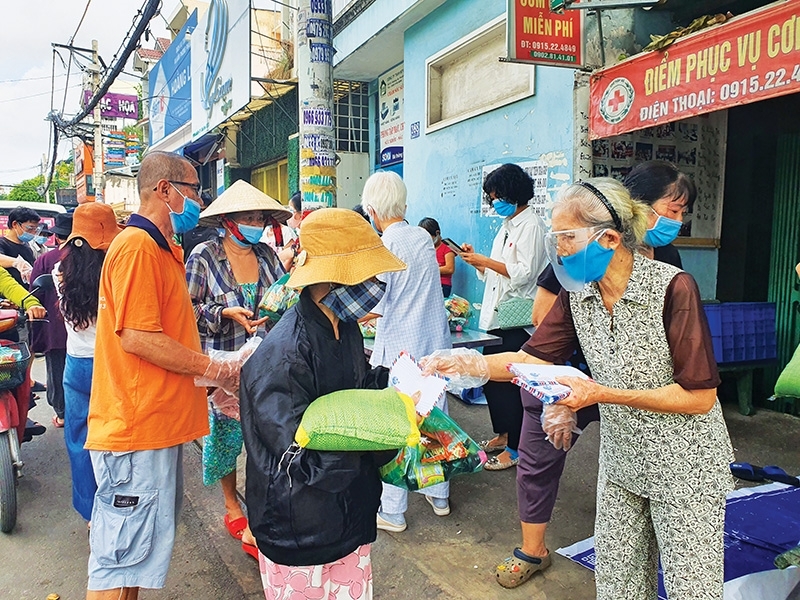Freelance workers in pandemic centres longing for sufficient financial support
 |
| Freelance workers in pandemic centres longing for sufficient financial support. Illustration photo: Le Toan |
“We have no source of income right now,” said Pham Hien, who lives on Hoang Hoa Tham street.
Hien is 32 years old and in the fourth month of her pregnancy. Previously, she worked at a hair salon on neighbouring Doi Can street, with a stable income of VND8 million ($350) per month.
However, because hairdressing is not considered an essential service, the owner decided to return the premises as operating expenses were too high. As a result, Hien suddenly became unemployed.
Hien said that she was the main breadwinner of the family. Her husband is blind and used to work at a massage parlour, a service which has also had to close down.
“I just asked the head of the neighbourhood group for permission to sell vegetables in the alley. I got his consent, but I could be disciplined because sidewalk encroachment is illegal. I have to try to make money for a few months before giving birth,” Hien said.
Nguyen Van Thanh, a GrabBike rider, could not hide his sorrow as Hanoi continues to practice social distancing. Thanh said his income has nearly halved because, despite the number of customers ordering food and using delivery service increasing, the number of passengers booking rides has fallen sharply.
He is also worried that if the pandemic in Hanoi becomes as complicated as Ho Chi Minh City, many drivers like him will have to stop working altogether.
Thanh used to be a salesman at an electronics store but has been a Grab driver for almost a year now. “I applied for jobs in many places, but all failed,” Thanh said.
Cases like those of Hien and Thanh are not uncommon these days. Freelance workers are not entitled to any benefits such as unemployment insurance or severance support. Therefore, the fear of not being able to cover their living expenses has become even greater than usual.
According to Resolution No.68/NQ-CP on policies to support employees and employers facing difficulties due to the pandemic, a support package amounting to VND26 trillion ($1.13 billion) includes support for freelance workers.
Although Hanoi Department of Labour, Invalids and Social Affairs is planning to deploy resources to the correct beneficiaries as soon as possible, not all freelance workers are supported. “The beneficiaries must be those who are in real difficulties,” said Bach Lien Huong, director of the department.
Many freelance workers in Hanoi also expressed their wish that the city would deploy zero-VND mini supermarkets or stalls similar to those in Ho Chi Minh City to help people in difficult circumstances.
Similar programmes had been implemented by many organisations in Hanoi during previous outbreaks and received positive responses from citizens in the capital.
Le Duy Binh, managing director of Economica Vietnam, said that nearly 18 million Vietnamese are currently informally employed. Millions of these are working in Hanoi and have no labour contract, low incomes, and long working hours.
Social distancing measures have caused millions of these freelancers in Hanoi and Ho Chi Minh City to fall into unemployment or underemployment, with many of them pushed into severe poverty.
Binh believes that the most important policy is to protect the livelihoods of freelancers, so that they can overcome the difficult days of social distancing.
“In addition to financial support measures, it is possible to take advantage of safe places to create livelihood opportunities for self-employed workers,” said Binh.
What the stars mean:
★ Poor ★ ★ Promising ★★★ Good ★★★★ Very good ★★★★★ Exceptional
Themes: COVID-19
- 67 million children missed out on vaccines because of Covid: UNICEF
- Vietnam records 305 COVID-19 cases on October 30
- 671 new COVID-19 cases recorded on October 1
- Vietnam logs additional 2,287 COVID-19 cases on Sept. 21
- People’s support decisive to vaccination coverage expansion: official
Related Contents
Latest News
More News
- Congratulations from VFF Central Committee's int’l partners to 14th National Party Congress (January 25, 2026 | 09:46)
- List of newly-elected members of 14th Political Bureau announced (January 23, 2026 | 16:27)
- 14th Party Central Committee unanimously elects To Lam as General Secretary (January 23, 2026 | 16:22)
- List of members of 14th Party Central Committee announced (January 23, 2026 | 09:12)
- Highlights of fourth working day of 14th National Party Congress (January 23, 2026 | 09:06)
- Press provides timely, accurate coverage of 14th National Party Congress (January 22, 2026 | 09:49)
- Press release on second working day of 14th National Party Congress (January 22, 2026 | 09:19)
- Minister sets out key directions to promote intrinsic strength of Vietnamese culture (January 22, 2026 | 09:16)
- 14th National Party Congress: Renewed momentum for OVs to contribute to homeland (January 21, 2026 | 09:49)
- Party Congress building momentum for a new era of national growth (January 20, 2026 | 15:00)

 Tag:
Tag:




















 Mobile Version
Mobile Version